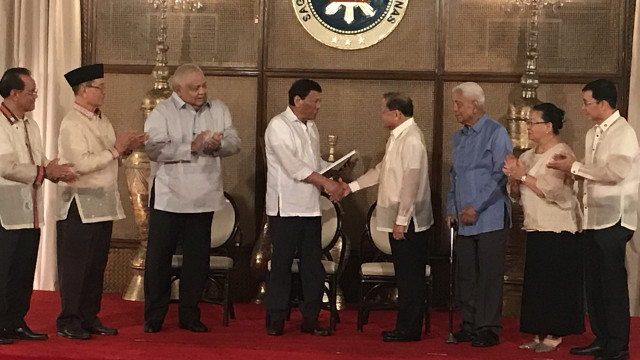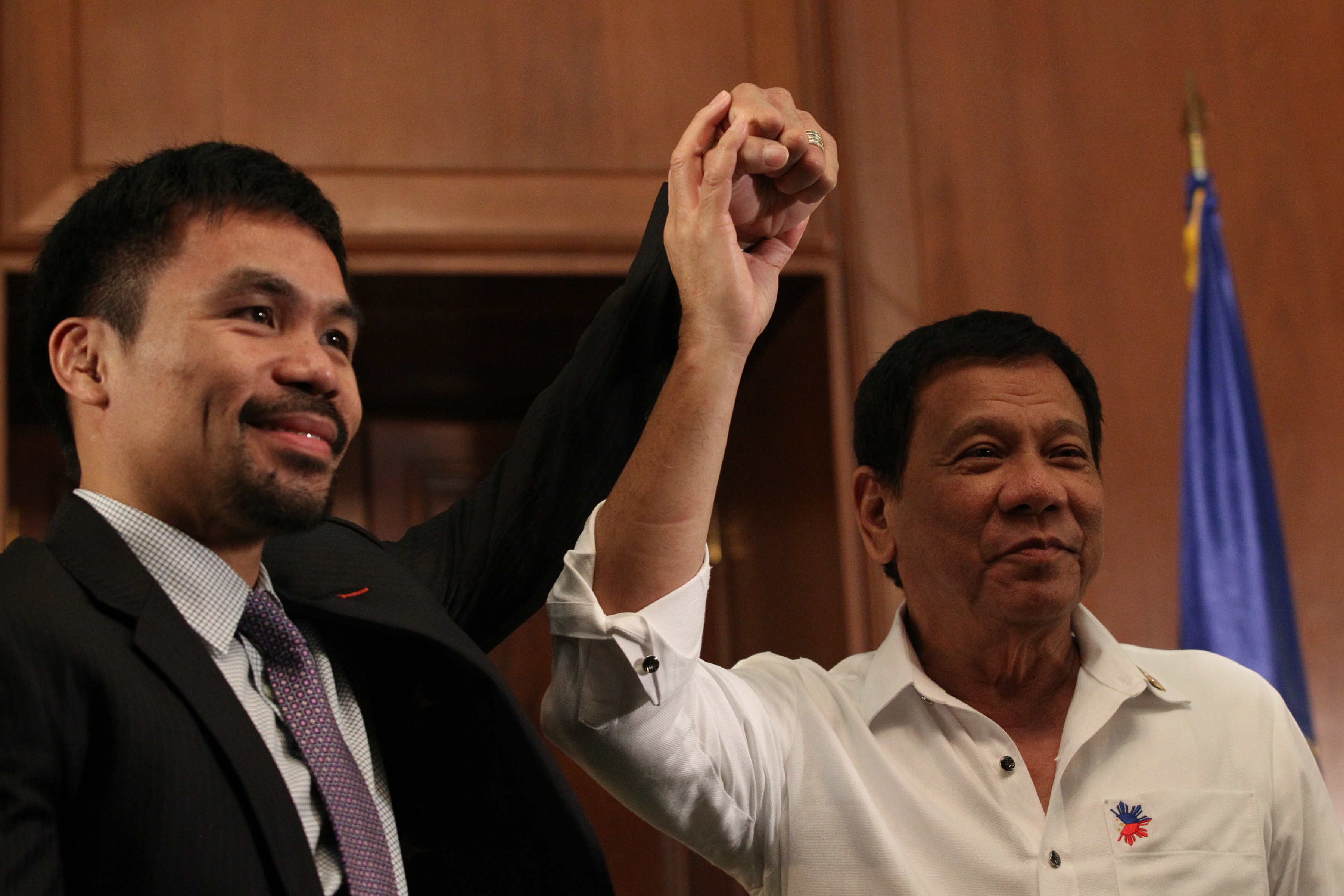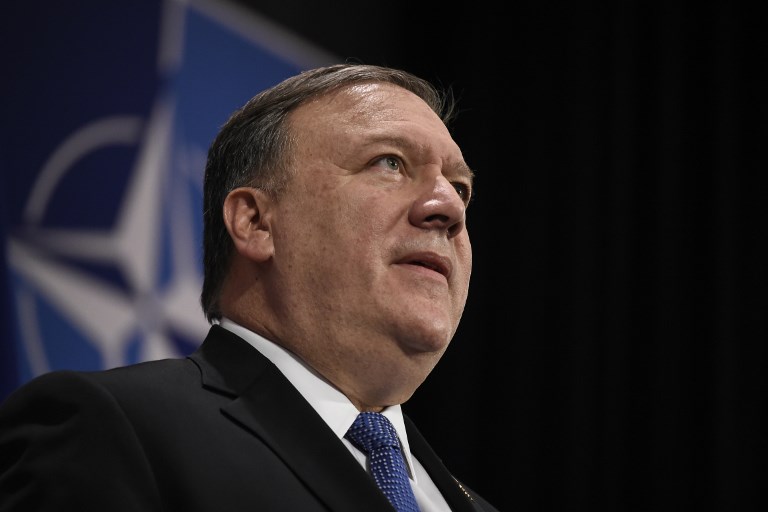
MANILA, Philippines – The Catholic Bishops' Conference of the Philippines (CBCP) on Monday, July 9, issued one of its strongest statements against abuses under the Duterte administration.
Released at the end of the CBCP's 117th plenary assembly from July 7 to 9, the statement covered issues such as the crackdown on "tambays" (loiterers), drug war killings, and the sin of calling God stupid.
Below is the full text of the CBCP statement titled "Rejoice and Be Glad!" as signed by the CBCP president, Davao Archbishop Romulo Valles:
"Blessed are the peacemakers, they shall be called sons and daughters of God." (Mt 5:9)
Dear brothers and sisters in Christ, do we not all aspire for the grace to be called "sons and daughters of God"? If we do so, then we must constantly strive to be peacemakers in these troubled times in our country. And that means to always strive to bring love where there is hatred, pardon where there is injury, faith where there is doubt, hope where there's despair, light where there is darkness, and joy where there is sadness (from the prayer for peace attributed to Saint Francis of Assisi).
Peace: Our common vocation and mission
Our enemies in this world are not fellow human beings, not "flesh and blood" (Eph 6:12). We do not fight our battles with guns and bullets. We do not seek protection from those who might wish to harm us by wearing bulletproof vests, because the battles that we fight are spiritual. In these times of darkness, when there's so much hatred and violence, when murder has become an almost daily occurrence, when people have gotten so used to exchanging insults and hurting words in social media, we admonish the faithful to remain steadfast in our common vocation and mission to actively work for peace.
But make no mistake about it; even the Master said, "Not as the world gives peace do I give you peace." (Jn 14:27). His peace is never the peace of compromise or capitulation to evil; it is also not about the absence of conflict and turmoil. Was he not rejected by his own townsfolk in Nazareth? (Lk 4:16-30) Was he not called crazy by his own relatives? (Mk 3:20-22). Was he not called a "prince of demons"? (Mk 3:22-30). Was he not called a drunkard and a lover of tax collectors and sinners? (Mt 11:19)
Did he not show us how to deal with adversities when he slept in the boat, or walked on water even in the midst of a storm? (Mk 4:35-40; Mk 6:45-52) But like the apostles, we are often so easily overcome by fear and panic. Even when we're already making baby steps on troubled waters like Saint Peter, we find ourselves sinking because of our "little faith" (Mt 14: 31). There is nothing that can calm us down in these turbulent times except the quiet recognition of him who assured us of his abiding presence — "Be not afraid; it is I!" (Mt 14:27)
The cost of witnessing to Christ
What is new about priests being murdered for witnessing to Christ? What is new about modern prophets being silenced by the treacherous bullets of assassins? What is new about servant leaders who are maligned because they have carried out their duties as shepherds configured to the person of their Chief Shepherd? Have you forgotten that "the blood of martyrs is the seed of Christians"? (Tertullian) It is what has kept the Church alive after 2,000 years. Be not afraid! Did not our Master say, "Do not be afraid of those who kill the body but cannot kill the soul. Rather be afraid of the one who can destroy both body and soul into Gehenna" (Mt 10:28)?
We are no strangers to ridicule and persecution. What we are going through is no different from what the Psalmist describes in Psalm 64: "They sharpen their tongues like swords; they aim bitter words like arrows to shoot at the innocent from ambush, shooting suddenly and recklessly." But what does the Lord tell his disciples when they are persecuted or humiliated for his sake? He tells them to "rejoice and be glad" (Mt 5:12). These are the very words with which Pope Francis opens his apostolic exhortation "Gaudete et Exsultate." They are the Lord's words to those persecuted and humiliated for his sake.
With the intention of calling us all to strive for a life of holiness, Pope Francis says the Lord does not want us "to settle for a bland and mediocre existence" (GE 1). How have we been taught to deal with persecution? Listen to what the apostle, Saint Paul, says, "When we are insulted, we respond with a blessing; when we are persecuted, we bear it patiently; when slandered, we respond gently. We have become the world’s refuse, the scum of all; that is the present state of affairs" (1 Cor 4:12-13).
And how are we to deal with divisions among ourselves? How are we to deal with fellow "Christians" who see nothing wrong about the killings, who just laugh when our God is blasphemed, and who take part in passing on fake news? Did not the Lord himself warn us that part of the exigencies of working for peace is having to go through the crucible of conflicts? (Lk 12:51-53)
There will always be those among us who profess the faith in Christ but are so easily seduced by the empty promises of Satan. Remember him who once sold the master for 30 pieces of silver because he had allowed himself to be mastered by Satan? Saint Paul is right in saying, "…there have to be divisions among you in order that those who are genuine among you may become known." (ESV 1 Cor 11:19)
The sufferings of the poor
Our sufferings as Church leaders are nothing compared to the sufferings of the poor in our country. Do we not hear the cry of poor slum-dwellers being jailed for "loitering"? Have they forgotten that for the homeless urban poor – the little alleys between their flimsy homes also serve as kitchens, bathrooms, recreation spaces, and playgrounds for their children? Have they forgotten that they live in tiny dwellings that are razed quickly to the ground when fire strikes, because they do not have proper roads?
Do we not feel the sufferings of drug addicts who are labeled as "non-humans," and are stigmatized as criminals when their names end up in the dreaded "drug watch lists"? Yes, we are aware of the sufferings of those who have been victimized by substance abusers, but can we not see them also as sick people who are struggling with a disease? Should we not rather look at them also as victims who are crying out for help?
Are we to remain as bystanders when we hear of people being killed in cold blood by ruthless murderers who dispose of human lives like trash? Do we not realize that for every drug suspect killed, there is a widowed wife and there are orphaned children left behind– who could hardly even afford a decent burial for their loved ones? Do we not care when poor people's homes are searched without warrants, or when drug suspects are arrested without warrants, or detained without charges?
Do we not care about the misery of people charged of drug-related offenses and packed like sardines in extremely congested jails? Can we even bear the thought of seeing most of them languishing in jail, knowing that rehabilitation is what many of them need?
Do we not hear of the sufferings of indigenous peoples who are displaced from their ancestral lands in order to give way to mining companies and dams? And how do we feel about communities that are forced to leave their homes for fear of being caught in the crossfire of conflicts between government troops and insurgents?
How are we affected when our own troops die because of unceasing hostilities that have not been adequately addressed through peaceful dialogue?
We have a saying in Tagalog, "Ang sakit ng kalingkingan ay ramdam ng buong katawan." (The pain of one part of the body is felt by the whole body.) Alas, this is not always true! There is no way we can feel each other's pains when some parts of the body are numbed by sheer indifference.
To those in this world who boast of their own wisdom, those who arrogantly regard themselves as wise in their own estimation and the Christian faith as nonsense, those who blaspheme our God as stupid, Saint Paul's words are to the point: "For the stupidity of God is wiser than human wisdom, and the weakness of God is stronger than human strength." (1 Cor 1: 25) And to those who ridicule our faith, we say with Saint Paul, "God chose the foolish of the world to shame the wise, and God chose the weak of the world to shame the strong, and God chose the lowly and despised of the world, those who count for nothing, to reduce to nothing those who are something, so that no human being might boast before God." (1 Cor 1:27-29).
The way of Jesus
We wish to remind those who have been angered by the insulting statements of people in authority; remember what the Lord had taught his disciples. He said, "But to you who hear I say… bless those who curse you, pray for those who mistreat you. To the person who strikes you on one cheek, offer the other one as well…" (Lk 6:27-29). Vengeance is never the way of Christ. It is not the way of Jesus to return evil for evil; no, we can conquer evil only with good (Rom 12:21). Up to the last moment of his breath, he had nothing but words of mercy towards his tormentors, "Father, forgive them for they do not know what they do" (Lk 23:34).
There are those who accuse us of getting involved in political moves to destabilize the government. Nothing can be farthest from the truth. Our concern is never the establishment of any earthly kingdoms. Worldly kingdoms come and go. We work only for God’s kingdom which is beyond this world — so that we can start learning to live life "on earth as it is in heaven" (Mt 6:10). For the times in our history when we fell into the temptation of working for political power, we can only bow in shame and say, never again! We do not proclaim a false image of God, such as one who is just watching from heaven like a ruthless deity who threatens us of damnation in hell all the time. Ours is the God revealed to us in Jesus Christ – the God who saves, a God "rich in mercy and compassion," a God involved in our history, a God who – for love of us – emptied himself totally, and "became poor, so that by his poverty we might become rich" (2 Cor 8:9).
Church and government
The Church respects the political authority, especially of democratically-elected government officials, as long as they do not contradict the basic spiritual and moral principles we hold dear, such as respect for the sacredness of life, the integrity of creation, and the inherent dignity of the human person.
We are not political leaders, and certainly not political opponents of government. The Church has, throughout history, coexisted with countless forms of government. The Church has always been and will always be a partner of government (especially in the LGUs and barangays) in countless endeavors for the common good, especially in addressing the needs of the most disadvantaged sectors of society. Sometimes we qualify the collaboration as "critical," mainly to distinguish our differences in terms of ultimate goals, even as we partner in some shared endeavours.
Needless to say, on some specific issues, collaboration might not be possible because of our spiritual and moral beliefs, which we persistently propose, but never impose on the unwilling. In such instances, we can only invoke our right to conscientious objection. We do recognize the constitutional provision of the separation of church and state, mainly in the sense of distinction of roles in society. When we speak out on certain issues, it is always from the perspective of faith and morals, especially the principles of social justice, never with any political or ideological agenda in mind.
Church of sinners, called to holiness
We admit humbly that we are a Church made of members who are "wretched but chosen" (Miserando atque Eligendo, Pope Francis' episcopal motto). We are a Church of sinners called to conversion and holiness at the same time. We bow in shame when we hear of abuses being committed by some of our fellow Church leaders – especially those ordained to "act in the person of Christ." We hold ourselves accountable for their actions, and accept our duty to correct them – as duly mandated by our own higher authorities in the universal Church.
We humbly admit that we have many weaknesses and shortcomings, human as we are. We have no reason to justify our weaknesses on the basis of our participation in the human condition, because we profess faith in the God who embraced the human condition, precisely to set a new template of humanity in his son Jesus Christ. We draw a lot of strength from Saint Paul, who desperately begged the Lord to remove his weakness but only got these words as assurance, "My grace is enough for you; for in weakness power reaches perfection. It is when I am weak that I am strong" (2 Cor 12:9).
Call to prayer and fasting
On July 16, 2018, on the feast of the Blessed Mother of Mount Carmel, the mountain associated with the bold challenge of the prophet Elijah in defense of God (2 Kings 18), let us spend a day of prayer and penance, invoking God's mercy and justice on those who have blasphemed God's Holy Name, those who slander and bear false witness, and those who commit murder or justify murder as a means for fighting criminality in our country. We invite you to join us, your bishops, in three days of fasting, prayer, and almsgiving from July 17 to 19, 2018.
We commend you, our dear people of God, to the maternal care of the woman to whom Jesus entrusted his "Beloved Disciple" and said, "Behold your son!" (Jn 19:26) We, for our part, behold her — our mother in faith — with filial love. Mary, mother of the Church, be near to us especially when we tend to despair and run out of the wine of faith, hope and charity (Jn 2:1-11). Teach us to do only what your Son asks of us. And when we lose heart in the face of persecution, may we stand by you at the foot of the cross and regain our strength from the blood and water that flowed from the wounded side of your Beloved Son, our Lord and Savior, Jesus Christ. Amen.
For the Catholic Bishops' Conference of the Philippines,
Most Reverend Romulo Valles, DD
Archbishop of Davao
President, CBCP
July 9, 2018
– Rappler.com


















